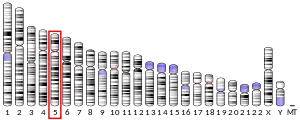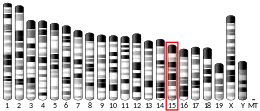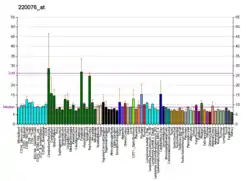ANKH
Progressive ankylosis protein homolog (ANK ilosis H omolog) is a protein that in humans is encoded by the ANKH gene.[5][6][7]
| ANKH | |||||||||||||||||||||||||||||||||||||||||||||||||||
|---|---|---|---|---|---|---|---|---|---|---|---|---|---|---|---|---|---|---|---|---|---|---|---|---|---|---|---|---|---|---|---|---|---|---|---|---|---|---|---|---|---|---|---|---|---|---|---|---|---|---|---|
| Identifiers | |||||||||||||||||||||||||||||||||||||||||||||||||||
| Aliases | ANKH, ANK, CCAL2, CMDJ, CPPDD, HANK, MANK, ANKH inorganic pyrophosphate transport regulator, SLC62A1 | ||||||||||||||||||||||||||||||||||||||||||||||||||
| External IDs | OMIM: 605145 MGI: 3045421 HomoloGene: 10664 GeneCards: ANKH | ||||||||||||||||||||||||||||||||||||||||||||||||||
| |||||||||||||||||||||||||||||||||||||||||||||||||||
| |||||||||||||||||||||||||||||||||||||||||||||||||||
| |||||||||||||||||||||||||||||||||||||||||||||||||||
| |||||||||||||||||||||||||||||||||||||||||||||||||||
| |||||||||||||||||||||||||||||||||||||||||||||||||||
| Wikidata | |||||||||||||||||||||||||||||||||||||||||||||||||||
| |||||||||||||||||||||||||||||||||||||||||||||||||||
This gene encodes a multipass transmembrane protein that is expressed in joints and other tissues and controls pyrophosphate levels in cultured cells. Mutation at the mouse 'progressive ankylosis' (ank) locus causes a generalized, progressive form of arthritis accompanied by mineral deposition, formation of bony outgrowths, and joint destruction. The human homolog is virtually identical to the mouse protein and ANKH-mediated control of pyrophosphate levels has been suggested as a possible mechanism regulating tissue calcification and susceptibility to arthritis in higher animals.[7]
References
- GRCh38: Ensembl release 89: ENSG00000154122 - Ensembl, May 2017
- GRCm38: Ensembl release 89: ENSMUSG00000022265 - Ensembl, May 2017
- "Human PubMed Reference:". National Center for Biotechnology Information, U.S. National Library of Medicine.
- "Mouse PubMed Reference:". National Center for Biotechnology Information, U.S. National Library of Medicine.
- Ho AM, Johnson MD, Kingsley DM (Jul 2000). "Role of the mouse ank gene in control of tissue calcification and arthritis". Science. 289 (5477): 265–70. Bibcode:2000Sci...289..265H. doi:10.1126/science.289.5477.265. PMID 10894769.
- Williams CJ, Zhang Y, Timms A, Bonavita G, Caeiro F, Broxholme J, Cuthbertson J, Jones Y, Marchegiani R, Reginato A, Russell RG, Wordsworth BP, Carr AJ, Brown MA (Sep 2002). "Autosomal dominant familial calcium pyrophosphate dihydrate deposition disease is caused by mutation in the transmembrane protein ANKH". Am J Hum Genet. 71 (4): 985–91. doi:10.1086/343053. PMC 419998. PMID 12297989.
- "Entrez Gene: ANKH ankylosis, progressive homolog (mouse)".
External links
- GeneReviews/NCBI/NIH/UW entry on Craniometaphyseal Dysplasia
- Human ANKH genome location and ANKH gene details page in the UCSC Genome Browser.
Further reading
- Williams CJ (2003). "Familial calcium pyrophosphate dihydrate deposition disease and the ANKH gene". Current Opinion in Rheumatology. 15 (3): 326–31. doi:10.1097/00002281-200305000-00023. PMID 12707589. S2CID 24811510.
- Netter P, Bardin T, Bianchi A, et al. (2005). "The ANKH gene and familial calcium pyrophosphate dihydrate deposition disease". Joint Bone Spine. 71 (5): 365–8. doi:10.1016/j.jbspin.2004.01.011. PMID 15474385.
- Maruyama K, Sugano S (1994). "Oligo-capping: a simple method to replace the cap structure of eukaryotic mRNAs with oligoribonucleotides". Gene. 138 (1–2): 171–4. doi:10.1016/0378-1119(94)90802-8. PMID 8125298.
- Hughes AE, McGibbon D, Woodward E, et al. (1996). "Localisation of a gene for chondrocalcinosis to chromosome 5p". Hum. Mol. Genet. 4 (7): 1225–8. doi:10.1093/hmg/4.7.1225. PMID 8528213.
- Suzuki Y, Yoshitomo-Nakagawa K, Maruyama K, et al. (1997). "Construction and characterization of a full length-enriched and a 5'-end-enriched cDNA library". Gene. 200 (1–2): 149–56. doi:10.1016/S0378-1119(97)00411-3. PMID 9373149.
- Nürnberg P, Tinschert S, Mrug M, et al. (1997). "The gene for autosomal dominant craniometaphyseal dysplasia maps to chromosome 5p and is distinct from the growth hormone-receptor gene". Am. J. Hum. Genet. 61 (4): 918–23. doi:10.1086/514880. PMC 1716005. PMID 9382103.
- Andrew LJ, Brancolini V, de la Pena LS, et al. (1999). "Refinement of the chromosome 5p locus for familial calcium pyrophosphate dihydrate deposition disease". Am. J. Hum. Genet. 64 (1): 136–45. doi:10.1086/302186. PMC 1377711. PMID 9915952.
- Rojas K, Serrano de la Peña L, Gallardo T, et al. (2000). "Physical map and characterization of transcripts in the candidate interval for familial chondrocalcinosis at chromosome 5p15.1". Genomics. 62 (2): 177–83. doi:10.1006/geno.1999.5997. PMID 10610710.
- Nagase T, Kikuno R, Nakayama M, et al. (2001). "Prediction of the coding sequences of unidentified human genes. XVIII. The complete sequences of 100 new cDNA clones from brain which code for large proteins in vitro". DNA Res. 7 (4): 273–81. doi:10.1093/dnares/7.4.271. PMID 10997877.
- Nürnberg P, Thiele H, Chandler D, et al. (2001). "Heterozygous mutations in ANKH, the human ortholog of the mouse progressive ankylosis gene, result in craniometaphyseal dysplasia". Nat. Genet. 28 (1): 37–41. doi:10.1038/88236. PMID 11326272.
- Reichenberger E, Tiziani V, Watanabe S, et al. (2001). "Autosomal dominant craniometaphyseal dysplasia is caused by mutations in the transmembrane protein ANK". Am. J. Hum. Genet. 68 (6): 1321–6. doi:10.1086/320612. PMC 1226118. PMID 11326338.
- Nelson PS, Clegg N, Arnold H, et al. (2002). "The program of androgen-responsive genes in neoplastic prostate epithelium". Proceedings of the National Academy of Sciences of the United States of America. 99 (18): 11890–5. Bibcode:2002PNAS...9911890N. doi:10.1073/pnas.182376299. PMC 129364. PMID 12185249.
- Pendleton A, Johnson MD, Hughes A, et al. (2002). "Mutations in ANKH cause chondrocalcinosis". Am. J. Hum. Genet. 71 (4): 933–40. doi:10.1086/343054. PMC 378546. PMID 12297987.
- Strausberg RL, Feingold EA, Grouse LH, et al. (2003). "Generation and initial analysis of more than 15,000 full-length human and mouse cDNA sequences". Proceedings of the National Academy of Sciences of the United States of America. 99 (26): 16899–903. Bibcode:2002PNAS...9916899M. doi:10.1073/pnas.242603899. PMC 139241. PMID 12477932.
- Tsui FW, Tsui HW, Cheng EY, et al. (2003). "Novel genetic markers in the 5'-flanking region of ANKH are associated with ankylosing spondylitis". Arthritis Rheum. 48 (3): 791–7. doi:10.1002/art.10844. PMID 12632434.
- Clark HF, Gurney AL, Abaya E, et al. (2003). "The secreted protein discovery initiative (SPDI), a large-scale effort to identify novel human secreted and transmembrane proteins: a bioinformatics assessment". Genome Res. 13 (10): 2265–70. doi:10.1101/gr.1293003. PMC 403697. PMID 12975309.
- Williams CJ, Pendleton A, Bonavita G, et al. (2003). "Mutations in the amino terminus of ANKH in two US families with calcium pyrophosphate dihydrate crystal deposition disease" (PDF). Arthritis Rheum. 48 (9): 2627–31. doi:10.1002/art.11133. PMID 13130483.
This article is issued from Wikipedia. The text is licensed under Creative Commons - Attribution - Sharealike. Additional terms may apply for the media files.




